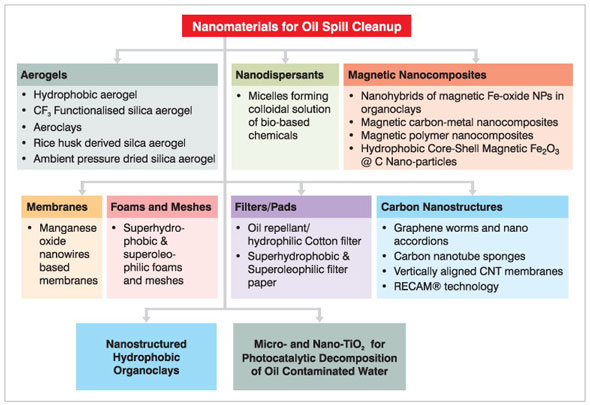| The recent oil spill in the Gulf of Mexico is widely acknowledged to be among the worst ocean oil spills in world history. Inevitably, the spill has once again raised serious concerns worldwide about the likely environmental impact of such catastrophic oil spills caused by oil tanker accidents at sea or mishaps during loading and unloading of oil from tankers at seaports. Similar concerns are also associated with discharge of oil in areas around oil wells and oil storage facilities. Such oil spills can cause havoc to marine ecology (sea birds, mammals, algae, coral, seagrass etc.), beside the health hazards to the human population located in nearby coastal zones. Moreover, the economic loss suffered by oil companies resulting from oil-spillage is enormous. | |
| Numerous solutions have been proposed for dealing with the problem of oil spills. These include | |
Conventional techniques are not adequate to solve the problem of massive oil spills. In recent years, nanotechnology has emerged as a potential source of novel solutions to many of the world's outstanding problems. Although the application of nanotechnology for oil spill cleanup is still in its nascent stage, it offers great promise for the future. In the last couple of years, there has been particularly growing interest worldwide in exploring ways of finding suitable solutions to clean up oil spills through use of nanomaterials. Fuente: |
Blog de cursos y estudiantes de Químicas del Departamento de Ciencias Quimico-Biológicas en la Universidad de las Américas Puebla.
Friday, November 04, 2011
Nanotechnology-based solutions for oil spills
Subscribe to:
Post Comments (Atom)
NEODIMIO ¡no te lo pierdas!

-
Un campo de investigación reciente y muy interesante es el de las máquinas moleculares. Inspirándose en la mecánica biológica, muchos han bu...
-
De entre todos los compuestos químicos que existen, quizá sean los llamados compuestos de coordinación los que mayores dificultades ofrecen ...


No comments:
Post a Comment